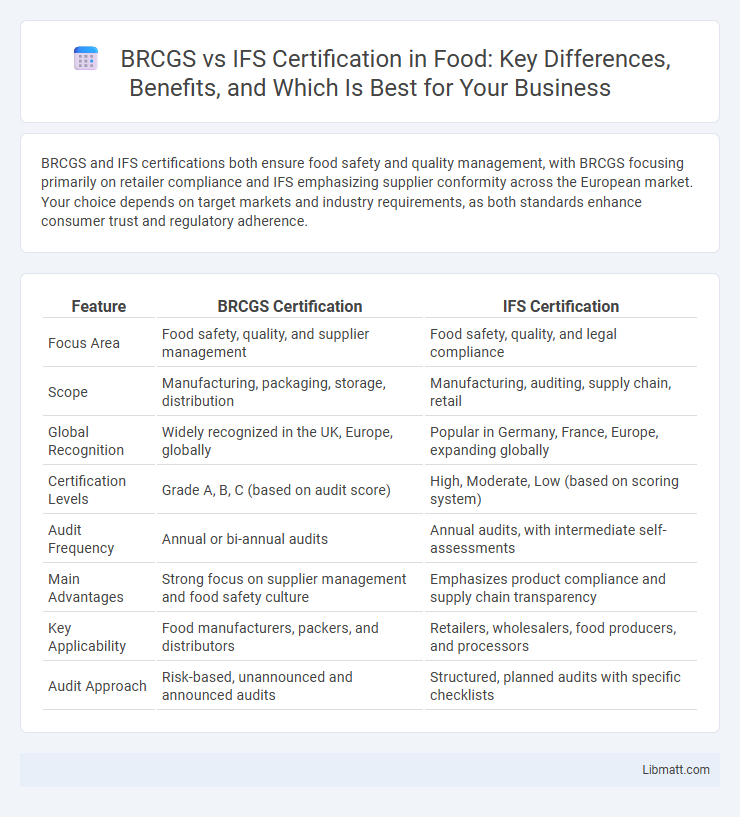BRCGS and IFS certifications both ensure food safety and quality management, with BRCGS focusing primarily on retailer compliance and IFS emphasizing supplier conformity across the European market. Your choice depends on target markets and industry requirements, as both standards enhance consumer trust and regulatory adherence.
Table of Comparison
| Feature | BRCGS Certification | IFS Certification |
|---|---|---|
| Focus Area | Food safety, quality, and supplier management | Food safety, quality, and legal compliance |
| Scope | Manufacturing, packaging, storage, distribution | Manufacturing, auditing, supply chain, retail |
| Global Recognition | Widely recognized in the UK, Europe, globally | Popular in Germany, France, Europe, expanding globally |
| Certification Levels | Grade A, B, C (based on audit score) | High, Moderate, Low (based on scoring system) |
| Audit Frequency | Annual or bi-annual audits | Annual audits, with intermediate self-assessments |
| Main Advantages | Strong focus on supplier management and food safety culture | Emphasizes product compliance and supply chain transparency |
| Key Applicability | Food manufacturers, packers, and distributors | Retailers, wholesalers, food producers, and processors |
| Audit Approach | Risk-based, unannounced and announced audits | Structured, planned audits with specific checklists |
Introduction to BRCGS and IFS Certification
BRCGS certification, developed by the British Retail Consortium, focuses on ensuring food safety, quality, and operational criteria across the supply chain, predominantly targeting retail and manufacturing sectors. IFS (International Featured Standards) certification centers on auditing food, products, and logistics suppliers to ensure consistent safety and quality standards that align with international market requirements. Both certifications serve as globally recognized benchmarks that help organizations demonstrate compliance with stringent food safety and quality protocols.
Overview of BRCGS Certification
BRCGS Certification is a globally recognized standard for food safety, packaging, storage, and distribution, designed to ensure product quality and compliance with regulatory requirements. It provides a comprehensive framework for managing food safety risks and maintaining traceability throughout the supply chain. Your business can enhance consumer trust and market access by achieving BRCGS Certification, demonstrating commitment to rigorous safety and quality standards.
Overview of IFS Certification
IFS Certification is a globally recognized standard for auditing food, household, and personal care products, focusing on ensuring product safety and quality throughout the supply chain. It emphasizes risk management, process control, and compliance with legal requirements, helping organizations demonstrate commitment to high standards and gain consumer trust. Your company can leverage IFS Certification to enhance market access and improve operational efficiency.
Key Differences Between BRCGS and IFS
BRCGS certification emphasizes food safety and quality standards specifically for suppliers in the retail and food manufacturing sectors, while IFS certification targets food producers and wholesalers aiming to ensure product safety and compliance with customer specifications. The audit process for BRCGS involves a risk-based approach with higher scrutiny on product safety systems, whereas IFS focuses more on the management system's effectiveness and continuous improvement. Understanding these key differences helps you choose the appropriate certification that aligns with your business goals and industry requirements.
Certification Process: BRCGS vs IFS
The BRCGS certification process emphasizes a stringent audit system focused on food safety, quality management, and operational criteria, requiring detailed documentation and on-site inspections that align with global standards. IFS certification involves a comprehensive assessment of food, non-food, and logistics processes, with a focus on customer-specific requirements and process efficiency, ensuring compliance with international benchmarks. Your choice between BRCGS and IFS certification depends on your industry priorities and the specific certification scope most relevant to your business operations.
Audit Requirements and Procedures
BRCGS certification requires comprehensive audits that emphasize site safety, product quality, and regulatory compliance, with unannounced audits being a standard part of the process. IFS certification audits focus heavily on a risk-based approach, assessing food safety management systems and supplier controls through a structured checklist. You should prepare for both certifications by understanding their specific audit scopes, documentation demands, and continuous improvement criteria.
Documentation and Compliance Standards
BRCGS certification requires detailed documentation aligned with the Global Standard for Food Safety, ensuring rigorous tracking of food safety hazards and quality control measures. IFS certification emphasizes comprehensive compliance with food safety and quality standards, mandating thorough documentation of processes, audits, and corrective actions. Your choice between BRCGS and IFS will impact how your food safety management system is structured and maintained for regulatory adherence.
Industry Acceptance and Global Recognition
BRCGS Certification and IFS Certification are both highly respected standards within the food, packaging, and retail industries, with extensive acceptance among global retailers and manufacturers. BRCGS is widely recognized for its rigorous focus on food safety and quality management, making it a preferred choice in the UK and Europe, while IFS holds strong influence in continental Europe and is favored by retailers seeking integrated supply chain assurance. Your choice between these certifications should consider the regional market demands and the specific industry sectors where global recognition and customer trust are critical for success.
Benefits of BRCGS and IFS Certification
BRCGS certification enhances global supply chain recognition, supports compliance with food safety standards, and boosts consumer confidence through rigorous auditing processes. IFS certification promotes consistency in product quality, improves risk management, and strengthens transparency for retailers and manufacturers, facilitating access to European and international markets. Both certifications drive operational excellence and demonstrate commitment to safety, quality, and regulatory compliance in the food industry.
How to Choose Between BRCGS and IFS
Choosing between BRCGS and IFS certification depends on your business's geographical market focus and sector-specific requirements. BRCGS is widely recognized in the UK and suits food manufacturers and retailers emphasizing global safety standards, while IFS is preferred across European retailers, particularly in Germany and France, focusing on supplier chain transparency. Assessing client demands, product categories, and supply chain complexity helps determine the most strategic certification for market access and compliance.
BRCGS vs IFS Certification Infographic

 libmatt.com
libmatt.com